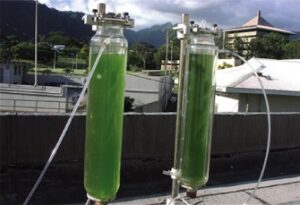Vanderbilt scientists develop an algae time machine, advancing biomedicine
Carl H. Johnson, Cornelius Vanderbilt Professor of Biological Sciences, along with a team of Vanderbilt scientists, have succeeded in adjusting the daily biological clock of cyanobacteria, making the blue-green algae a more prolific producer of renewable fuels, chemicals, and pharmaceuticals, like insulin.
 The ultimate solar-powered machines, cyanobacteria are like tiny workshops churning out everything from medicine to fuels. For years, scientists have been working to make cyanobacteria a more fruitful and versatile microbial cell factory. However, research hasn’t advanced as quickly as it has on other microbes like E. coli and yeast.
The ultimate solar-powered machines, cyanobacteria are like tiny workshops churning out everything from medicine to fuels. For years, scientists have been working to make cyanobacteria a more fruitful and versatile microbial cell factory. However, research hasn’t advanced as quickly as it has on other microbes like E. coli and yeast.
Because the microorganisms’ gene expression is tightly controlled by their internal clocks, cyanobacteria have a built-in snooze button. The Johnson Lab reprogrammed the gene expression by releasing circadian repressor elements in their regulatory pathways, resulting in a dramatic improvement in production of active enzymes and polypeptides that are important in biomedicine.
“Instead of focusing simply on the traditional ways of driving stronger gene expression of the desired product, we reasoned that the daily biological clock that modulates gene expression could be manipulated so that more stuff could be made 24/7,” said Johnson. “By inactivating the internal biological clock in cyanobacteria and its repression of gene expression, we could now be able to achieve a big upregulation of green bioproducts, including the medicine insulin.”
This work focusing on cyanobacteria is especially important because it’s easy and cost-effective to grow, using sunlight as an energy  source and thriving in nutrient-poor environments. The findings could allow green biotechnology to advance at an accelerated pace. Green biotech’s goal is to develop genetically altered photosynthetic organisms to serve as “bioreactors” that produce renewable fuels, pharmaceuticals, and chemical precursors with minimal environmental impact.
source and thriving in nutrient-poor environments. The findings could allow green biotechnology to advance at an accelerated pace. Green biotech’s goal is to develop genetically altered photosynthetic organisms to serve as “bioreactors” that produce renewable fuels, pharmaceuticals, and chemical precursors with minimal environmental impact.
Johnson collaborated on the research with scholars from the College of Arts and Science and the School of Engineering, including:
- Yao Xu, research associate professor of biological sciences
- Maria Luísa Jabbur, graduate research student
- Tetsuya Mori, research assistant professor of biological sciences
- Jamey Young, Cornelius Vanderbilt Professor of Chemical and Biomolecular Engineering
Read the full paper, “Clocking Out and Letting Go to Unleash Green Biotech Applications in a Photosynthetic Host” published in Proceedings of the National Academy of the United States of America (PNAS). The work was supported by grants from the National Institute of General Medicine Sciences, the Department of Energy, and the National Institutes of Health.

